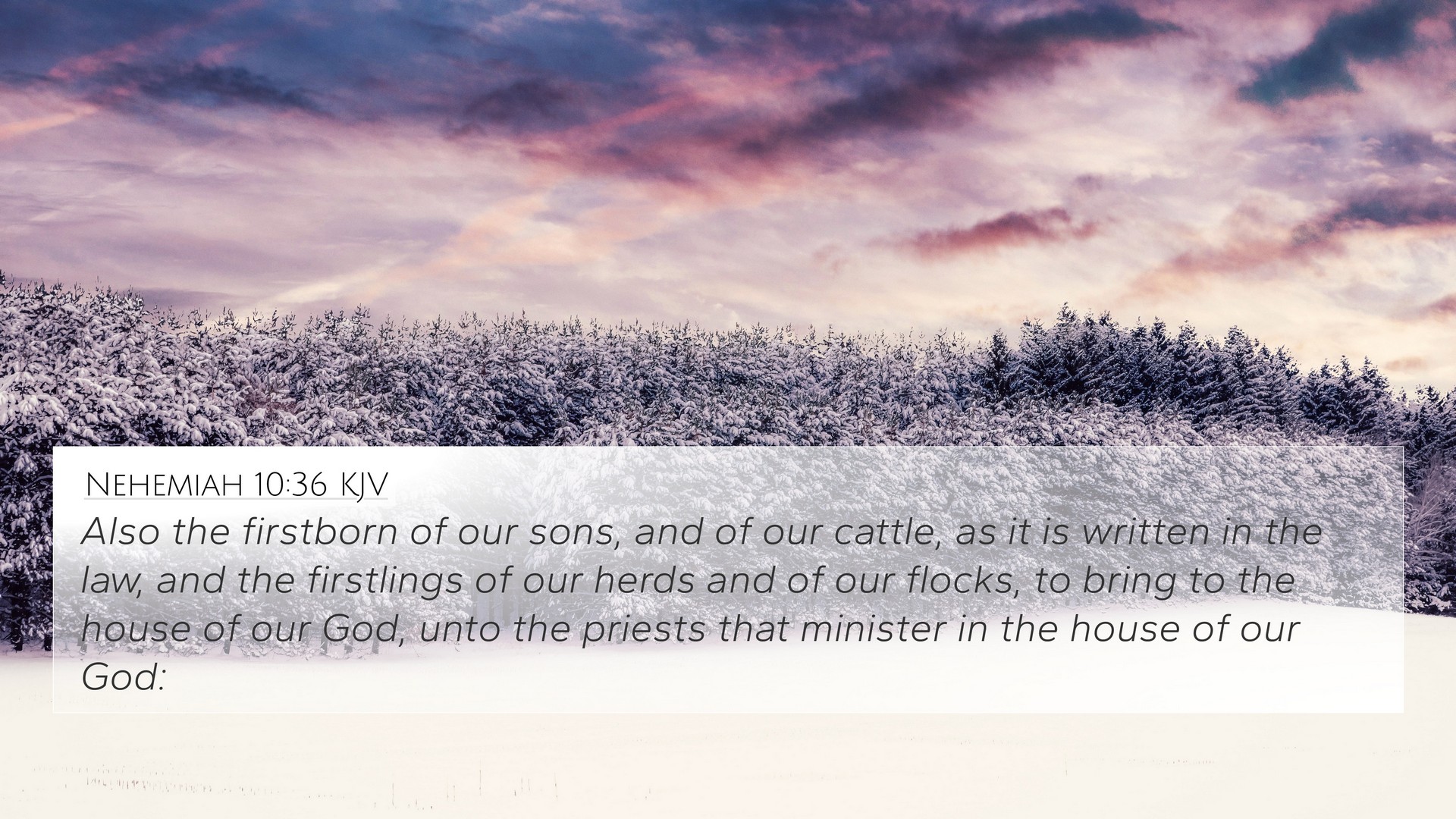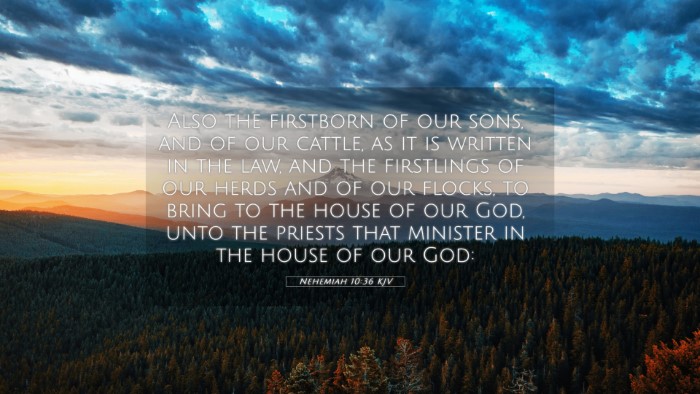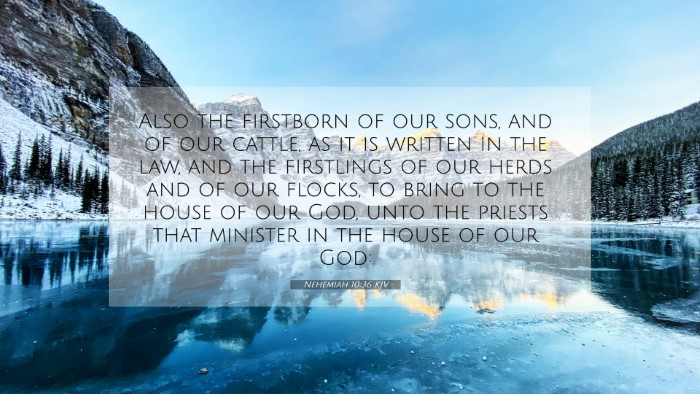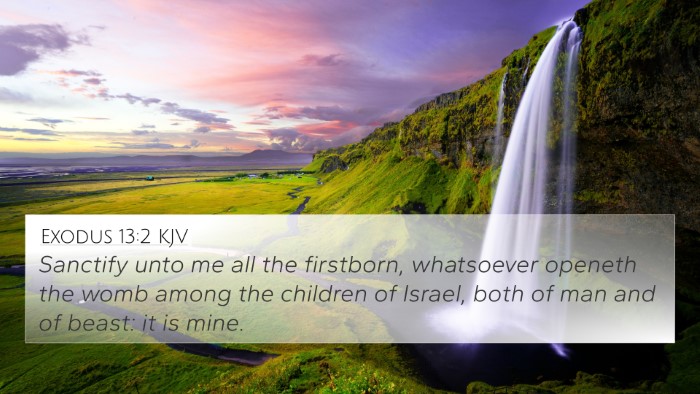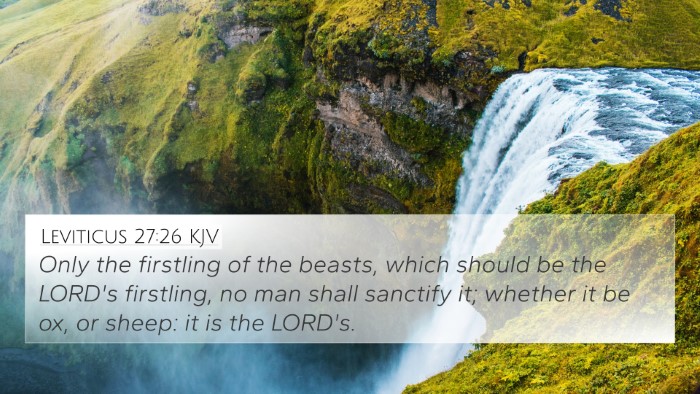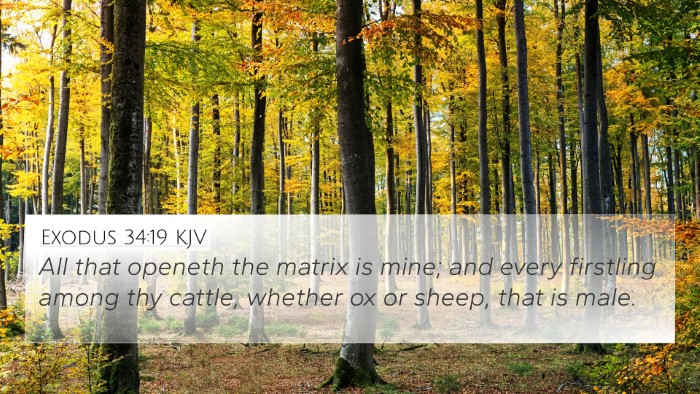Understanding Nehemiah 10:36
Verse Text: "Also we undertake to bring the firstfruits of our ground, and the firstfruits of all fruit of all trees, year by year, unto the house of the Lord:" (Nehemiah 10:36, KJV)
Summary of Insights from Public Domain Commentaries
Nehemiah 10:36 captures a committed response from the Israelites, emphasizing their intent to dedicate a portion of their yields to the Lord. The verse speaks to the practice of bringing firstfruits, a longstanding tradition in Israelite worship that underscored gratitude and dependency on God's provision.
Key Themes and Interpretations
- Theological Significance of Firstfruits: Matthew Henry discusses the spiritual importance of presenting firstfruits as an acknowledgment of God’s supremacy in blessing and sustaining the land. Delivering the first of the harvest signifies giving priority to God over personal gain.
- Commitment to God’s House: Albert Barnes emphasizes the communal aspect of this vow, highlighting that it reflects both individual and collective responsibility toward the temple, reinforcing the link between worship and daily living.
- Yearly Observance: Adam Clarke notes that the commitment to bring firstfruits year by year suggests an ongoing recognition of God’s sovereignty and grace, a reminder that every good gift originates from Him.
Cross-References and Related Verses
The practice presented in Nehemiah 10:36 is intricately tied to various scriptural themes throughout the Bible. Here are key cross-references that relate to this verse:
- Exodus 23:19: "The first of the firstfruits of your land you shall bring into the house of the Lord your God..." – This reinforces the commandment regarding firstfruit offerings.
- Leviticus 23:10: "Speak unto the children of Israel, and say unto them, When ye be come into the land which I give unto you, and shall reap the harvest thereof..." – Establishing the practice of offering firstfruits upon entering the Promised Land.
- Deuteronomy 26:2: "That thou shalt take of the first of all the fruit of the earth, which thou shalt bring of thy land..." – Affirms the dedication of first fruits as an act of remembrance and gratitude.
- Proverbs 3:9-10: "Honour the Lord with thy substance, and with the firstfruits of all thine increase..." – Highlights the importance of honoring God with our resources.
- Romans 11:16: "...if the firstfruit be holy, the lump is also holy..." – Connects the concept of first fruits to the sanctity of God’s people as a whole.
- 2 Corinthians 9:7: "Every man according as he purposeth in his heart, so let him give..." – Draws parallels between intentional generosity in the New Testament and the firstfruit offerings of the Old Testament.
- Hebrews 7:4-10: Discusses Melchizedek's priesthood and the significance of giving, alluding to the practice of offering and its continued relevance.
Connections Between Bible Verses
Nehemiah’s commitment to bringing firstfruits highlights a broader biblical principle regarding stewardship and dedication. By exploring the themes found in these verses, one can identify the connections and overarching narrative about God’s blessings and human responses. The practice of dedicating resources to God reflects a recurring motif throughout scripture, bridging the covenantal relationship established in the Old Testament to the teachings of stewardship in the New Testament.
Thematic Bible Verse Connections
In engaging with Nehemiah 10:36, several themes emerge that resonate with various parts of scripture:
- Stewardship: The act of offering firstfruits demonstrates the importance of stewardship, as seen in Matthew 25:14-30, the Parable of the Talents.
- Gratitude: Recognizing God’s provision fosters a spirit of gratitude, echoed in Psalms 103:2: "Bless the Lord, O my soul, and forget not all his benefits."
- Obedience: The vow to bring firstfruits is an act of obedience, reminiscent of Abraham’s faithfulness in Genesis 22 when he obeys God’s command.
- Community Responsibility: There’s a communal aspect to offerings, as elaborated in Acts 2:44-45, where believers shared their possessions.
Insights for Practical Application
The spiritual disciplines of giving biblical proportions are relevant in today's context. The act of dedicating resources can strengthen faith and function as a testament to reliance on God. Here are some practical applications drawn from this verse:
- Intentional Giving: Reflect on the priority of God in financial decisions through structured giving, such as tithes and offerings.
- Community Worship: Engage in communal practices that reinforce the collective responsibility of supporting church missions and community needs.
- Personal Reflection: Use Nehemiah 10:36 as a lens for personal reflection on how blessings are shared with others.
Tools for Bible Cross-Referencing
To deepen your understanding of Nehemiah 10:36 and its connections, various tools and resources are available that facilitate cross-referencing:
- Bible Concordance: A valuable tool that lists words and their occurrences throughout scripture, providing insight into themes and topics.
- Bible Cross-Reference Guide: Guides that assist in identifying verses that relate to one another, simplifying the study of comparative verses.
- Cross-Reference Bible Study: Engages readers in a systematic approach to explore interrelated scriptures.
- Bible Reference Resources: Online and print resources that categorize verses based on themes, making it easier to study scripture in context.
